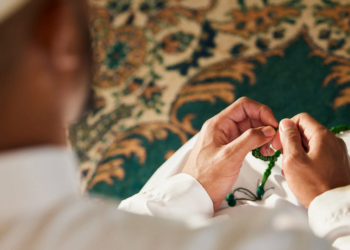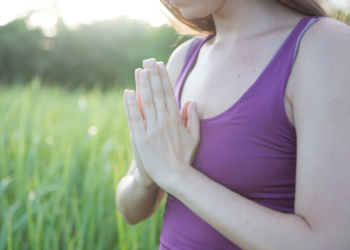No products in the cart.
How Do Prayers Help With Anxiety?
This post contains paid and/or affiliate links. I make a small commission at no extra cost to you. Please see our Privacy Policy.
Anxiety is a common condition that affects many individuals, leading to feelings of worry, fear, and stress. One effective technique for managing anxiety is through the use of positive affirmations.
Positive affirmations are short, powerful statements that challenge negative thoughts and encourage a more optimistic mindset. Positive affirmations can help rewire the brain, promote self-belief, and reduce anxiety levels.
When individuals repeat positive affirmations regularly, they can shift their focus from negative self-talk to more empowering and uplifting thoughts. By replacing thoughts such as “I can’t handle this” with “I am strong and capable,” individuals can cultivate a sense of self-assurance and confidence in their ability to cope with challenging situations. This shift in mindset can significantly reduce feelings of anxiety and promote a greater sense of calm and well-being.
Moreover, positive affirmations can change how individuals perceive themselves and the world around them. By incorporating affirmations such as “I am worthy of love and respect” or “I choose peace and joy in all aspects of my life,” individuals can foster a more positive self-image and outlook. This change in perspective can help reduce feelings of anxiety and enhance overall mental health and emotional well-being.
In addition to promoting a more positive mindset, positive affirmations can help individuals develop greater self-awareness and mindfulness. By practicing affirmations regularly, individuals become more attuned to their thoughts and emotions, allowing them to identify and challenge negative thought patterns that contribute to anxiety.
This increased self-awareness empowers individuals to take control of their mental and emotional state, leading to a greater sense of peace and inner calm.
Positive affirmations are a powerful tool for managing anxiety and promoting emotional well-being. By incorporating positive affirmations into daily practice, individuals can reframe negative thoughts, cultivate a more positive mindset, and reduce feelings of anxiety. With consistent use, positive affirmations can help individuals build resilience, self-confidence, and inner peace in the face of life’s challenges.
Connecting with a Higher Power to Find Inner Peace
Anxiety is a common experience that many individuals face at some point in their lives. It can manifest in various ways, impacting mental, emotional, and physical well-being. While different coping mechanisms and treatments are available, one beneficial approach for some is turning to prayer and connecting with a higher power.
The Role of Prayer in Managing Anxiety
Prayer is a practice that holds significant value for those who believe in the power of spirituality. It provides a sense of solace, comfort, and hope to individuals, especially during challenging times like dealing with anxiety. Engaging in prayer allows individuals to express their fears, worries, and concerns to a higher power, which can help alleviate the feeling of being overwhelmed or alone in their struggles.
Creating a Sense of Peace and Calm
Prayer has a unique way of quieting the mind and bringing about a sense of peace and calmness. By focusing on prayer, individuals can relinquish their anxious thoughts and surrender their worries to a higher source. This surrender can bring relief and reassurance, knowing that something greater is at play that can provide comfort and guidance in times of need.
Building Trust and Resilience
Through prayer, individuals can strengthen their trust in a higher power and develop resilience in facing their anxieties. Believing that there is a greater purpose and plan can instill a sense of hope and optimism, even in uncertainty and fear. This trust in a higher power can help individuals navigate through their challenges with a greater sense of inner peace and confidence.
Finding Support and Community
Prayer is often practiced in community settings, such as churches, mosques, temples, or other places of worship. Engaging in prayer with others who share similar beliefs can create a sense of support and camaraderie. This sense of community can provide individuals with a network of support, understanding, and encouragement as they navigate their anxiety and seek inner peace.
Prayer can be a powerful tool in helping individuals manage and alleviate anxiety. Individuals can find peace, calm, trust, and a community supporting them through their struggles with a higher power by connecting with them. Whether through personal prayer practices or joining prayer groups, incorporating prayer into one’s routine can be valuable for finding inner peace amidst anxiety.
How Mindfulness and Meditation Techniques Alleviate Anxiety
Mindfulness and meditation are powerful tools that can significantly help in managing and reducing anxiety. By focusing on the present moment and being fully aware of your thoughts and feelings without judgment, these practices can bring a sense of calm and relaxation to the mind and body. When dealing with anxiety, the constant worrying and overthinking about the future can be overwhelming.
Mindfulness and meditation offer a way to ground yourself in the present, allowing you to let go of anxious thoughts and find inner peace.
One of the key benefits of mindfulness and meditation is that they help regulate emotions. Anxiety often causes a whirlwind of negative emotions that can be difficult to control. Through regular mindfulness and meditation practice, individuals can learn to observe their emotions without getting absorbed by them. This ability to step back and view emotions objectively can prevent anxiety from spiraling out of control and help in managing it effectively.
Moreover, mindfulness and meditation techniques promote relaxation and reduce the physical symptoms of anxiety. Deep breathing exercises and guided meditation sessions can lower heart rate, reduce muscle tension, and alleviate symptoms such as restlessness and irritability. By incorporating these practices into your daily routine, you can create a sense of balance and ease that counteracts the stress and tension caused by anxiety.
Another essential aspect of mindfulness and meditation is their ability to enhance self-awareness. By paying attention to your thoughts and bodily sensations, you can gain a better understanding of the triggers that worsen your anxiety. This self-awareness is crucial in developing healthier coping mechanisms and breaking free from the cycle of anxious thoughts. With regular practice, individuals can cultivate a sense of clarity and perspective that allows them to approach anxiety from a place of strength and resilience.
Mindfulness and meditation are valuable tools for alleviating anxiety by promoting present-moment awareness, regulating emotions, reducing physical symptoms, and enhancing self-awareness. Incorporating these practices into your daily routine can effectively manage anxiety and cultivate a greater sense of calm and well-being.
Building a Supportive Community Through Prayer Groups
Prayer groups are communities of individuals who come together to engage in prayer, meditation, and spiritual support. These groups offer a unique space to share their burdens, joys, and concerns with like-minded individuals willing to listen, support, and pray for one another. Such a supportive community can be a powerful tool in managing anxiety and finding inner peace.
One of the key ways in which prayer groups help with anxiety is by providing a sense of belonging and connection. When individuals join a prayer group, they become part of a community with similar values and beliefs. This sense of belonging can help alleviate feelings of isolation and loneliness, which are common triggers for anxiety.
Additionally, prayer groups offer a safe and non-judgmental space where individuals can express their fears, worries, and anxieties without fear of criticism or rejection. This open sharing can lead to relief and catharsis, as individuals feel heard and understood by others who are going through similar struggles.
Furthermore, participating in prayer groups allows individuals to shift their focus from their anxieties to the needs and concerns of others. By praying for fellow group members and their intentions, individuals can experience a sense of purpose and meaning, which can help reduce feelings of anxiety and helplessness.
Moreover, collective prayer and positive energy in a group setting can create a strong sense of support and unity. Knowing that others are holding you in their thoughts and prayers can provide comfort and reassurance during difficult times, helping to manage anxiety and promote emotional well-being.
Prayer groups offer a valuable opportunity for individuals to build a supportive community, connect with like-minded individuals, express their worries openly, shift their focus from personal anxieties to collective prayers, and benefit from the healing power of group prayer. By actively participating in prayer groups, individuals can find solace, strength, and peace amid life’s challenges, ultimately helping to alleviate anxiety and cultivate a sense of inner calm.
Harnessing the Benefits of Gratitude Practices for Anxiety Relief
Gratitude practices are powerful tools that can significantly impact our mental well-being and help alleviate anxiety. When we cultivate a sense of gratitude, we shift our focus from what is lacking in our lives to what we appreciate and are thankful for. This shift in perspective can profoundly affect our emotional state and overall outlook on life.
Practicing gratitude regularly trains our minds to look for the positive aspects of our experiences, even in challenging times. This mental reframe can help reduce anxiety by promoting a sense of abundance rather than scarcity. Acknowledging and appreciating the good things in our lives can create a buffer against negative emotions and stressors.
Gratitude practices in our daily routines can be done in various ways. Keeping a gratitude journal, where you write down things you are grateful for daily, can help reinforce a positive mindset. Additionally, expressing gratitude towards others through acts of kindness or simply saying thank you can foster deeper connections and a sense of fulfillment.
When managing anxiety, prayer can serve as a form of gratitude practice. Whether through structured prayers or spontaneous conversations with a higher power, expressing thanks and appreciation can bring peace and calmness to the mind. Prayer allows individuals to surrender their worries and concerns, knowing they are not alone in facing life’s challenges.
In times of distress or uncertainty, turning to prayer can provide a sense of hope and respite from anxious thoughts. Through prayer, individuals can find comfort in their faith and trust that things will unfold as they are meant to. This surrender to a higher power can alleviate the need to control every aspect of life, easing the burden of anxiety and promoting a sense of acceptance.
Moreover, group prayer can create a supportive community where individuals can share their concerns, offer comfort, and collectively lift each other in need. This sense of belonging and unity can strengthen the emotional resilience of individuals, making them better equipped to cope with anxiety and stress.
Gratitude practices, including prayer, can be invaluable tools in managing anxiety and promoting overall well-being. By harnessing the benefits of gratitude, individuals can cultivate a positive mindset, build resilience in the face of challenges, and find solace in the support of a higher power and community.
Conclusion
These various strategies in one’s daily routine can significantly impact how individuals manage their anxiety. By embracing the power of positive affirmations, individuals can rewire their thought patterns and cultivate a more optimistic mindset. Connecting with a higher power through prayer offers comfort, guidance, and reassurance, serving as a source of inner peace during tumultuous times.
Practicing mindfulness and meditation techniques can help individuals ground themselves in the present moment, reducing feelings of overwhelm and anxiety.
Moreover, being part of a supportive prayer group fosters a sense of community and belonging, providing individuals with a safe space to share their struggles and receive encouragement. This camaraderie can alleviate feelings of isolation and offer a support network during challenging times. Additionally, incorporating gratitude practices into daily life can shift the focus from what is lacking to what is abundant, fostering a sense of contentment and peace.
Therefore, individuals can cultivate a holistic strategy for managing anxiety by integrating these multidimensional approaches – positive affirmations, connection to a higher power, mindfulness and meditation, community support through and gratitude practices, prayer groups; each of these practices complements the others, creating a comprehensive toolkit for promoting emotional well-being and resilience in the face of anxiety.
Ultimately, by embracing these practices and weaving them into daily life, individuals can empower themselves to navigate anxiety with strength, grace, and a sense of inner calm.













